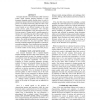Free Online Productivity Tools
i2Speak
i2Symbol
i2OCR
iTex2Img
iWeb2Print
iWeb2Shot
i2Type
iPdf2Split
iPdf2Merge
i2Bopomofo
i2Arabic
i2Style
i2Image
i2PDF
iLatex2Rtf
Sci2ools
COLING
1994
1994
Universal Guides And Finiteness And Symmetry Of Grammar Processing Algorithms
This paper presents a novel technique called "universal guides" which explores inherent properties of logic grammars (changing variable binding status) in order to characterize tbrmal criteria for termination in a derivation process. The notion of universal guides also offers a new framework in which both parsing and generation can be viewed merely as two different instances of the same generic process: guide consumption. This technique generalizes and exemplifies a new and original use of an existing concept of "proper guides" recently proposed in literature for controlling top-down left-to-right (TDLR) execution in logic progrmns. We show that universal guides are independent of a particular grammar evaluation strategy. Also, unlike proper guides they can be specified in the same mmmer for any given algorithm without knowing in advance whether the algorithm is a parsing or
| Added | 02 Nov 2010 |
| Updated | 02 Nov 2010 |
| Type | Conference |
| Year | 1994 |
| Where | COLING |
| Authors | Miroslav Martinovic |
Comments (0)

